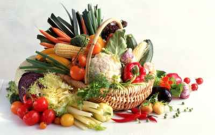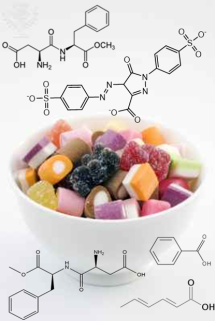Nutritionally significant food components and food additives
Biologically active compounds, nutritional assessment of food quality

Biologically active compounds can have positive as well as negative biological effects. Their content depends on the type of plant or growing conditions, but is also affected by the conditions of storage and technological processing. Modern analytical methods are used to monitor the levels of biologically active compounds and to assess their stability, based primarily on liquid chromatography techniques in conjunction with conventional detection and mass spectrometry.
The working group is dedicated to the determination of levels of carotenoids, tocopherols, chlorophylls, cyanogenic glycosides, polyphenols, flavonoids, phytoestrogens, galactolitips, glycoalkaloids and many other groups of substances in foods and food raw materials, feeds, microalgae or food supplements. Attention is paid to the determination of hydrophilic (B1, B2, B6, B9, C) but also lipophilic (A, E, D) vitamins, basic food components and raw materials such as carbohydrates (sugars, polyalcohols, starches, inulin polysaccharide), proteins, amino acids, fats (fatty acids) and others. The aim is a comprehensive assessment of food quality, including the determination of nutritional value. The stability of the monitored substances is studied.
As a member of the Czech Technological Platform for Organic Agriculture, we study the quality of organic farming products and organic food.
Publications:
- Jiru M., Stranska-Zachariasova M., Kohoutkova J., Schulzova V., Krmela A., Revenco D., Koplik R., Kastanek P., Fulin T., Hajslova J.: Potential of microalgae as source of health-beneficial bioactive components in produced eggs. Journal of Food Science and Technology (2021) (doi: 10.1007/s13197-020-04896-3)
- Koudela M., Schulzova V., Krmela A., Chmelarova H., Hajslova J., Novotny C.: Effect of Agroecological Conditions on Biologically Active Compounds and Metabolome in Carrot. Cells (2021) 104, 784. (doi: 10.3390/cells10040784)
- Bhave A., Schulzova V., Mrnka L., Hajslova J.: Influence of harvest date and post-harvest treatment on carotenoids and flavonoids composition in French marigold flowers. Journal of Agricultural and Food Chemistry (2020) 68 (30): 7880-7889. (doi: 10.1021/acs.jafc.0c02042)
- Novotny C., Schulzova V., Krmela A., Hajslova J., Svobodova K., Koudela M.: Ascorbic Acid and Glucosinolate Levels in New Czech Cabbage Cultivars: Effect of Production System and Fungal Infection. Molecules (2018) 23(8): 1855. (doi: 10.3390/molecules23081855)
- Bhave A., Schulzova V., Chmelarova H., Mrnka L., Hajslova J.: Assessment of the rosehips based on their biologically active compound content. Journal of Food and Drug Analysis (2017) 25 (3): 681-690. (doi: 10.1016/j.jfda.2016.12.019 )
- Pavelkova P., Krmela A., Schulzova V.: Determination of carotenoids in flowers and food supplements by HPLC-DAD. Acta Chimica Slovaca (2020) 13 ( 1): 6-12
- Rollova M., Gharwalova L., Krmela A., Schulzova V., Hajslova J., Jaros P., Kolouchova I., Matatkova O.: Grapevine extracts and their effect on selected gut-associated microbiota: In vitro study. Czech Journal of Food Sciences (2020) 38 (3):. 137-143 doi: 10.17221/308/2019-CJFS
- Humhal T., Kronusová O., Kaštánek P., Potočár T., Kohoutková J., Brányik T.: Influence of nitrogen sources on growth of thraustochytrids in waste water from the demineralization of cheese whey. Czech Journal of Food Sciences (2019) 37(5): 383-390. (doi: 10.17221/172/2018-CJFS)
Certified methodologies:
- Hajšlová J., Kohoutková J., Zachariášová M.: Method for determining the content of polyunsaturated fatty acids in micro-algae as part of feed for poultry and other animals. (2015) Certified methodology. VŠCHT, ISBN 978-80-7080-925-9
- Hajšlová J., Krmela A., Schulzová V.: Determination of inulin polysaccharide. Certified methodology (2015) VŠCHT, Praha. ISBN 978-80-7080-926-6
- Hajšlová J., Schulzová V., Krtková V., Nedělník J.: Determination of phytoestrogens in plant matrices. Certified methodology No. 2014/96506, (2014). ISBN 978-80-7080-874-0
- Hajšlová J., Schulzová V., Křížová L., Pavlok S.: Determination of phytoestrogens in biological material and dairy products. Certified methodology No. 2011/12-1 (2011) ISBN 978-80-7080-805-4
Additives

Additives, whether of natural or synthetic origin, are intentionally added to foods for technological purposes such as improving or maintaining their durability, appearance, consistency, taste or smell. It is a diverse group of substances, especially from the categories of organic and inorganic dyes, sweeteners, aroma intensifiers, preservatives, antioxidants, emulsifiers, etc., differing in chemical structure and properties and their use is legally controlled. The research topic of the group includes the development and implementation of modern analytical strategies, providing new possibilities in the control of food safety and authenticity. Attention is focused on the development of multidetection methods, using mainly the technique of liquid chromatography in conjunction with high-resolution mass spectrometry to control the levels of additives, defined by Regulation (EC) No. 1333/2008 from the group of sweeteners, preservatives and synthetic colors in food. The working group also offers significant use in proving the addition of unauthorized synthetic substances, especially dyes, to food.
Publications:
- Krmela A., Kharoshka A., Schulzova V., Pulkrabova J., Hajslova J.: A Simple LC–MS Multi-analyte Method to Determine Food Additives and Caffeine in Beverages. LCGC Europe (2020) 33(7): 327-335
Certified methodologies:
- Krmela A., Kharoshka A., Schulzová V., Stránská M., Hajšlová J.: Method for determination of sweeteners and preservatives in beverages and foodstuffs. (2020) Certified methodology. VŠCHT, ISBN: 978-80-7592-080-5
Projects:
- TAČR - Development of innovative analytical strategies usable for control of safety and authenticity of food and food raw materials TJ02000238, 2019 - 2020
